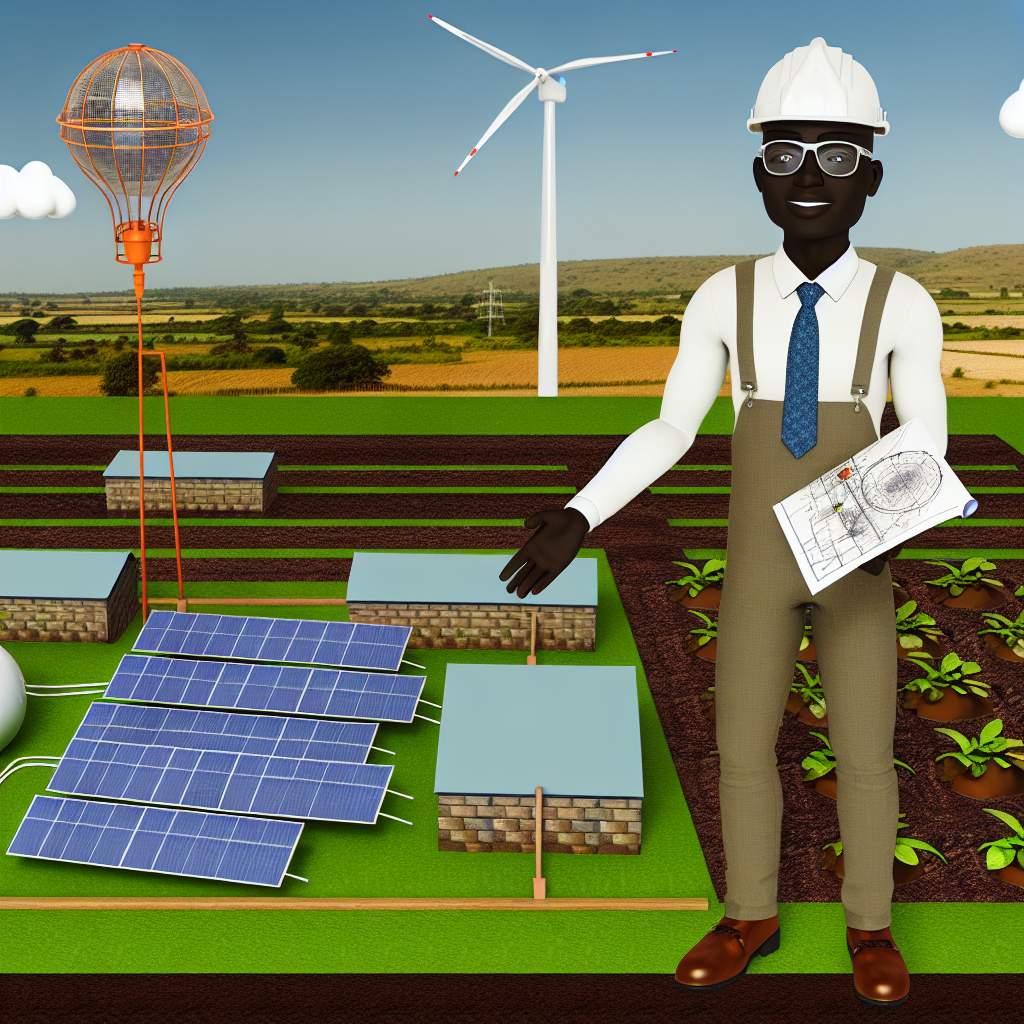Introduction
Understanding the importance of sustainability in farming is crucial for the longevity of our food systems.
By incorporating engineering principles into agriculture, we can develop innovative solutions to address challenges such as water scarcity, soil erosion, and energy efficiency.
Engineering principles focus on designing systems that are efficient, resilient, and environmentally friendly.
By integrating these principles into farming practices, we can create sustainable farms that produce high yields while minimizing negative impacts on the environment.
Utilizing Technology in Farming
Role of Technology in Modern Agriculture
Technology plays a crucial role in modern agriculture by improving efficiency and sustainability through the use of various tools and equipment.
From precision farming to automated machinery, technology has revolutionized the way farmers manage their operations.
Satellite imagery, GPS systems, and drones are utilized to monitor crop health, soil conditions, and even detect pests or diseases.
These technologies provide valuable data that allows farmers to make informed decisions, optimize resources, and reduce environmental impact.
Through the use of technology, farmers can maximize crop yields while minimizing inputs such as water, fertilizers, and pesticides.
Examples of Engineering Tools and Equipment in Sustainable Farming Practices
- Irrigation Systems
Drip irrigation and sprinkler systems deliver water directly to the root zone, reducing water wastage and promoting plant health. - Precision Planting Equipment
GPS-guided planters ensure optimal seed placement, spacing, and depth, leading to uniform crop emergence and higher yields. - Soil Sensors
These devices measure moisture levels, nutrient content, and temperature in the soil, enabling farmers to tailor fertilizer applications accordingly. - Climate-Controlled Greenhouses
Advanced systems regulate temperature, humidity, and lighting to create optimal growing conditions for crops year-round. - Robotic Harvesters
Automated machinery equipped with sensors and cameras can efficiently harvest ripe crops, reducing labor costs and increasing productivity. - Livestock Monitoring Systems
Wearable sensors track animal health, behavior, and production metrics, allowing farmers to intervene promptly and improve overall herd management. - Renewable Energy Technologies
Solar panels, wind turbines, and bioenergy systems provide clean, sustainable power to farms, reducing reliance on fossil fuels. - Data Analytics Platforms
Software tools analyze large datasets from sensors, satellites, and other sources to generate insights and recommendations for farm management.
Soil Health and Management
Soil health is crucial for sustainable farming as it directly impacts crop productivity and environmental sustainability.
Healthy soil provides essential nutrients to plants, supports beneficial microorganisms, and helps retain water for irrigation.
Maintaining soil health promotes biodiversity, reduces erosion, and contributes to long-term soil fertility.
By focusing on soil health, farmers can minimize the need for chemical inputs, leading to cost savings and environmental benefits.
Engineering Solutions for Improving Soil Fertility and Structure
- Cover Cropping: Planting cover crops such as legumes or grasses helps improve soil structure and fertility by adding organic matter.
- No-Till Farming: Implementing no-till practices reduces soil disturbance, preserves soil structure, and increases water infiltration.
- Crop Rotation: Rotating crops helps prevent soil nutrient depletion and minimizes the impact of pests and diseases on specific crops.
- Precision Agriculture: Using technology like soil sensors and GPS-guided equipment allows farmers to optimize nutrient application and irrigation practices.
- Soil Testing: Regular soil testing helps farmers understand soil health and make informed decisions about nutrient management.
- Agroforestry: Integrating trees and crops on the same piece of land improves soil fertility, enhances biodiversity, and provides additional income streams.
- Soil Amendments: Applying organic amendments like compost or biochar can enhance soil structure, increase nutrient availability, and promote microbial activity.
- Drainage Systems: Installing drainage systems like tile drains or contour bunds helps manage soil moisture levels, prevent waterlogging, and improve crop performance.
Implementing engineering solutions for soil health and management is essential for building a sustainable farm.
By prioritizing soil health, farmers can improve crop yields, protect the environment, and ensure long-term agricultural productivity.
Uncover the Details: Scholarships for Metallurgical Engineering Students in Nigeria
The Significance of Water Conservation in Agriculture
Water conservation is crucial for sustainable farming practices.
It helps in reducing water wastage and ensures a more efficient use of this precious resource.
Efficient water management plays a significant role in promoting crop growth and maximizing yields.
By conserving water, farmers can optimize their irrigation practices and minimize water runoff.
Conserving water also helps in preserving groundwater levels.
Groundwater levels are essential for the long-term sustainability of agricultural operations.
It ensures that future generations will have access to sufficient water resources for farming.
Additionally, water conservation contributes to environmental protection.
It reduces water pollution and soil erosion.
Water conservation promotes the overall health of the ecosystem.
It minimizes the impact of agriculture on surrounding water bodies.
Engineering Techniques for Efficient Water Usage in Farming
- Drip irrigation systems deliver water directly to the roots of plants, reducing evaporation and water wastage.
- Collecting rainwater for irrigation purposes can help in reducing dependency on groundwater sources.
- Mulching helps in retaining soil moisture and reducing evaporation, thus conserving water in agricultural fields.
- Soil moisture sensors monitor the moisture levels in the soil and provide data for optimizing irrigation schedules.
- Rotating crops with different water requirements can help in conserving water and maintaining soil health.
- Using technology such as GPS and drones can help farmers in precisely applying water where it is needed, reducing wastage.
- Treating and reusing wastewater from farms can help in conserving water and reducing the discharge of pollutants into the environment.
- Planting cover crops helps in reducing evaporation, improving soil structure, and conserving water in agricultural fields.
Find Out More: Farm Structures Designed by Agricultural Engineers
Energy Efficiency on the Farm
The implementation of renewable energy sources on farms is crucial for sustainability.
By harnessing natural resources such as sunlight and wind, farmers can reduce their reliance on non-renewable energy sources and decrease their carbon footprint.
Importance of Renewable Energy Sources on Farms:
- Reduces greenhouse gas emissions
- Lowers energy costs in the long run
- Promotes environmental stewardship
Engineering Principles for Implementing Solar Panels, Wind Turbines, etc.:
- Assess the energy needs of the farm
- Identify suitable locations for solar panels and wind turbines
- Consider the angle and orientation of solar panels for maximum sunlight exposure
- Ensure proper installation and maintenance of renewable energy systems
- Monitor energy production and adjust system as needed for optimal efficiency
By integrating renewable energy sources into farm operations, farmers can not only reduce their environmental impact but also save money in the long term.
It is essential for farmers to work with engineers and energy experts to ensure the successful implementation of solar panels, wind turbines, and other renewable energy technologies on their farms.
Learn More: Surveying Education: Degrees, Diplomas, and Courses

Waste Management
Waste management is a crucial aspect of sustainable farming practices that cannot be overlooked.
- Implement a composting system to recycle organic waste, such as plant residues and animal manure.
- Utilize engineering solutions to design efficient composting bins or piles that promote decomposition.
- Recycling water and nutrients from waste can enhance soil fertility and reduce the need for external inputs.
- Explore technologies like anaerobic digesters to convert organic waste into biogas for energy production.
- Establish a waste reduction plan by optimizing farm processes to minimize excess or unnecessary materials.
- Set up designated recycling stations for plastic containers, metal scraps, and other recyclable farm waste.
- Educate farm workers and stakeholders on the importance of waste segregation and proper disposal methods.
Uncover the Details: Future Trends in Land Surveying and Geoinformatics
Integrating Engineering Principles for Sustainable Farms
Integrating engineering principles in the design and construction of sustainable farms is crucial.
Engineering concepts such as efficient water management, renewable energy systems, and precision agriculture play a vital role in creating a farm that is environmentally friendly, economically viable, and socially responsible.
By focusing on these key principles, farmers can optimize resource utilization, minimize waste, and increase productivity.
Sustainable farming not only benefits the environment but also supports the local community and ensures the long-term success of the farm.
Incorporating engineering elements in farm planning and development is a proactive approach that aligns with the growing global emphasis on sustainability.
Transform Your Career with Expert Guidance
Get personalized mentorship consulting that’s tailored to your unique path. Our expert advice is actionable and exclusive.
Get StartedThis allows farmers to adapt to changing climates, market demands, and technological advancements while maintaining ecological balance and promoting biodiversity.
The marriage of farming practices with engineering principles leads to a more resilient and efficient agricultural system.
It empowers farmers to overcome challenges, improve efficiency, and enhance overall farm sustainability.
Therefore, embracing engineering principles is essential for building a sustainable farm.
A sustainable farm can thrive in the face of various challenges while contributing positively to the environment and society.
By harnessing the power of engineering, farmers can create a resilient and prosperous future for themselves and future generations.
Additional Resources
Ademiku Adeleye – Scholar – Mastercard Foundation Scholars …
Building a common vision for sustainable food and agriculture




